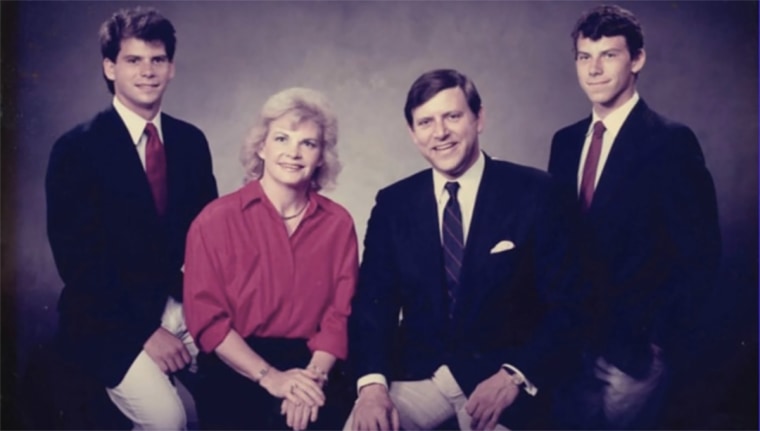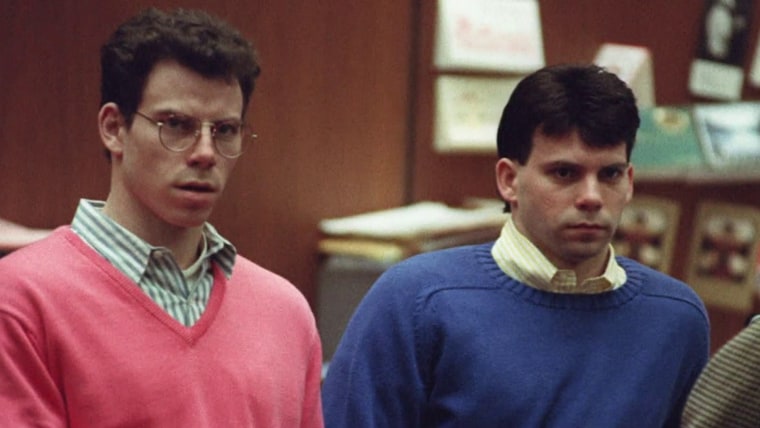In the summer of 1989, Erik and Lyle Menendez burst into the den of their family’s Beverly Hills home armed with shotguns and opened fire, killing their mother and father.
After the brothers were charged in the murders of Jose and Kitty Menendez, they said they gunned down their parents in self-defense after years of horrific sexual abuse at the hands of their father — an allegation disputed by prosecutors, who argued the claims were false and the siblings were motivated by financial gain.

Their televised trial, which captured the brothers recounting the alleged abuse in grim and graphic detail, ended when the jury could not reach a verdict. After a second trial, the siblings were convicted of first-degree murder and sentenced to life without the possibility of parole.
In October, Los Angeles County’s former top prosecutor, George Gascón, said the brothers had been model prisoners and recommended that they be resentenced to 50 years to life in prison. Six months later, after a series of delays and opposition from the county's new district attorney, a judge approved Gascón's recommendation.
That decision made the brothers eligible for parole immediately. But after a pair of hearings in August, parole officials concluded that they were not ready to be released from prison.
The brothers were pursuing their freedom on two other paths — a petition that seeks to overturn their convictions and an application for clemency with California Gov. Gavin Newsom. A judge denied their petition in September. Newsom has not yet weighed in on clemency.
Here are key dates in the case:
Aug. 20, 1989: A grisly murder in Beverly Hills
Kitty and Jose were shot to death in their den. In a frantic 911 call that night, Lyle reported that someone had killed his parents.
The brothers initially told authorities that the killings could have been linked to their father’s work — he was a wealthy executive at an entertainment company whose founder had ties to the pornography industry — but authorities found no evidence to support the claim and focused on the brothers.
In the days after the double murder, investigators discovered that the brothers had been spending lavishly and, believing they could be disinherited from the family’s multimillion-dollar estate, sought out their father’s will.
March 8, 1990: The brothers are arrested
Beverly Hills Police announced Lyle’s arrest. Erik, who was in Israel for a tennis tournament, was in custody days later.
When their trial began three years later, the brothers relied on a legal doctrine known as “imperfect self-defense” and testified that their father had sexually abused them for years. Lyle said he’d been molested from the ages of 6 to 8; Erik said it was going on at the time of the killings.
The siblings fatally shot their parents, they testified, after Lyle confronted Jose about his brother’s abuse. When Lyle threatened to expose his father, he testified, Jose appeared to threaten him and his brother.
Prosecutors alleged that the sex abuse claims were false and identified money as the motive in the killings.

March 20, 1996: Convicted of first-degree murder
A mistrial was declared after separate juries for the brothers could not reach a unanimous verdict on whether they should be convicted of murder, as prosecutors sought, or manslaughter, if they believed the defense.
During a retrial that began the following year, the brothers were not allowed to invoke imperfect self-defense after a ruling from the state’s high court. And after prosecutors discovered that Lyle had asked a friend and an ex-girlfriend to make false claims for the defense, he did not testify at the retrial.
They were convicted and sentenced to life without the possibility of parole.

Oct. 24, 2024: A chance for release
Los Angeles County District Attorney George Gascón announced that he would seek to have the brothers resentenced to 50 years to life, a term that would make them immediately eligible for parole.
The prosecutor said that while their crimes were brutal and premeditated, the brothers had been “exceptional” inmates who helped others behind bars, remained out of trouble and took college courses.
Gascón was ousted from office weeks after his announcement. His successor, Nathan Hochman, spent months reviewing the case and announced in March that he opposed resentencing because the brothers had not taken full responsibility for their crimes.
Hochman released a list of 16 "unacknowledged lies" that he said the brothers had continued to tell about the murders, including their assertion that the killings were done in self-defense. Hochman later pointed to a recent psychological evaluation that found the brothers were at "moderate" risk of committing violence if released from prison.
Aug. 21, 2025: Parole denied for Erik Menendez
Despite that opposition — and Hochman’s failed attempts to withdraw from Gascón’s recommendation — a judge ruled in May that the brothers did not pose an “unreasonable risk” and resentenced them to 50 years to life.
That ruling made them eligible for parole immediately.
But three months later, after a 10-hour hearing, a panel of officials found that Erik Menendez was not suitable for parole. Commissioner Robert Barton cited recent prison violations and his continued willingness to commit crimes.
“This is a tragic case," Barton said. "I agree that not only two, but four people, were lost in this family."
While family members spoke for the brothers' release, and Barton said that he was impressed with the support, he said that the panel could still deny parole for Erik Menendez.
The denial is for three years, but Erik Menendez can petition to appear before the board sooner.
Aug. 22, 2025: Lyle Menendez denied parole
Like his brother, Lyle was denied parole after a lengthy hearing before a panel of commissioners.
Parole Commissioner Julie Garland, who presided over the hearing, cited prison violations and "anti-social" behaviors in her decision that Lyle would pose a threat to the public if released.
“We find your remorse is genuine. In many ways, you look like you’ve been a model inmate. You have been a model inmate in many ways who has demonstrated the potential for change,” Garland said.
“But despite all those outward positives, we see ... you still struggle with anti-social personality traits like deception, minimization and rule breaking that lie beneath that positive surface,” she said.
Like Erik, the denial is for a minimum of three years. But Lyle can petition the board for a hearing sooner.
Sept. 16, 2025: Petition to overturn convictions is denied
In May 2023, the brothers filed a petition challenging their convictions that cited what their attorneys described as new evidence that could have changed the outcomes of their original trials.
There were two pieces of evidence included in the writ of habeas corpus: an affidavit from a former member of Menudo, the Puerto Rican boy band, alleging that Jose Menendez raped him before and after a show in New York City when he was 13.
At the time, Jose Menendez was an executive with RCA Records, which had a multi-album contract with the band.
Also included in the petition was a photocopied letter that Erik said he wrote to a cousin months before the murders. The letter appears to show Erik telling the cousin about the abuse and saying that it’s getting worse.
But in a Sept. 16 opinion, Los Angeles Superior Court Judge William Ryan said that the evidence was not "particularly strong" and would not have resulted in a hung jury or a conviction on a lesser offense.
"The evidence alleged here is not so compelling that it would have produced a reasonable doubt in the mind of at least one juror or supportive of an imperfect self-defense instruction,” he wrote.
